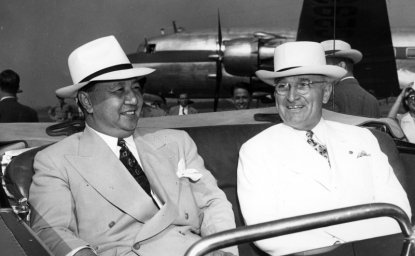How Stalin Elevated the Chinese Communist Party to Power in Xinjiang in 1949
Records recently added to DigitalArchive.org show that Soviet aid (along with military cunning, political skill and some luck) enabled the 1949 PLA invasion of Xinjiang.

A blog of the History and Public Policy Program
Records recently added to DigitalArchive.org show that Soviet aid (along with military cunning, political skill and some luck) enabled the 1949 PLA invasion of Xinjiang.

Records just added to DigitalArchive.org show that Soviet aid (along with military cunning, political skill and some luck) enabled the 1949 PLA invasion
The Chinese People’s Liberation Army invasion in October 1949 of Xinjiang, the vast “province” bordering the Mongolian People’s Republic and Soviet Central Asia, was a stunning development.
Mao Zedong’s eyes had been on Xinjiang for a while. He worried that his rivals, the Nationalist Party, would hang onto Xinjiang and use it as a base for continued operations against the CCP. Stalin stoked Mao’s fears, warning that countries antagonistic to the CCP, such as Great Britain, could “activate the Muslims” in Xinjiang in order to “continue the civil war.” And of course, taking hold of the oil and other strategic resources present in Xinjiang motivated Mao.
But no one expected the PLA to move quickly. The talk within the Chinese Communist Party during the spring and summer of 1949 was of invasion in 1950, or even later, in 1951. Mao Zedong and the Northwest Army Field Commander, Peng Dehuai, spoke often of the practical challenges of executing a ground invasion of Xinjiang any sooner: PLA troops were still fighting in Shaanxi, Gansu, and Qinghai provinces, Xinjiang was too distant, there was no reliable means of transportation, the weather was turning cold, and troop morale was low.
So how did the PLA do it?
To be sure, the successful invasion of Xinjiang in autumn 1949 was the result of a complicated, delicate dance that could have easily gone any other way. It depended on the PLA’s rapid successes in the civil war in Gansu Province and elsewhere in Northwest China. It was accelerated by the CCP’s co-opting of former political and military rivals in Xinjiang, including 100,000 Nationalist troops. And it may have benefited from the suspicious-but-apparently-accidental deaths of several important local leaders from the East Turkestan Republic, a de facto independent state aligned with the Soviet Union in what is now northern Xinjiang.
The invasion was military cunning combined with political skill and, frankly, dumb luck. But it also couldn’t have happened without the aid of the Soviet Union. Moscow’s support to the CCP in this area has been known in general terms for some time. A set of newly translated documents from the Russian archives, however, offers the precise details of Soviet assistance.
What did the Soviet Union do to help? First, it provided the means of transportation that allowed for a speedy invasion. In late September 1949, Mao issued a desperate plea for assistance to Stalin: “the railroads in this region are poor, the conditions difficult, there are few people, and there is no food,” he wrote. “We acutely need and hope that you will help us with 30-50 transport aircraft to ship food, clothing, key personnel, and some of the troops.”
What if such assistance was not forthcoming? Mao warned that he would have to delay his invasion until March-April 1950. “This would be detrimental to the solution of the Xinjiang problem.” Stalin agreed. He volunteered the requested airplanes.
Second, the Soviet Union provided other supplies that were crucial to the PLA’s invasion. After Stalin loaned the aircraft, Mao asked for aviation fuel. “We are encountering great difficulty in this matter.” Once again, Stalin pledged his support.
Food was one of the most vexing problems for the Chinese armed forces. The PLA needed huge amounts of grain and other foodstuffs to feed its 90,000 men involved in the invasion, but it hesitated to requisition too much food from the local population in Xinjiang. Commander Peng Dehuai understood that it would be a public relations disaster—one that could spark local resistance—if the new Chinese army was perceived as an occupying force in Xinjiang. So, again, Mao asked his Soviet friends for help: this time, for 10,000 tons of grain. Stalin consented.
To sum up, the Soviet Union facilitated the PLA’s entry into Xinjiang and then acted as a lifeline for Chinese soldiers on the ground. Without this support, it is doubtful that the CCP could have arrived in Xinjiang or consolidated power as quickly as it did--even as other stars aligned in the PLA's favor.
Mao repaid these debts to Stalin in part by keeping the Soviet leader fully abreast of developments relating to the invasion. He even shared verbatim copies of reports written by the first PLA units to enter Xinjiang. Mao also sent Stalin a copy of Peng Dehuai’s notes from an inspection of Xinjiang in December 1949, a key document that informed subsequent Sino-Soviet negotiations over economic cooperation in the region.
What the Soviet leader hoped to gain from all of this is a subject of continuing debate. It seems likely that he was after a mix of economic and security guarantees in Xinjiang, and provided assistance in order to create an amicable environment for later negotiations. Other sources now emerging from the former Soviet archives provide some clues, and will be the subject of future postings on Sources & Methods and the Wilson Center’s Digital Archive.


A global leader in making key archival records accessible and fostering informed analysis, discussion, and debate on foreign policy, past and present. Read more


The Cold War International History Project supports the full and prompt release of historical materials by governments on all sides of the Cold War. Read more


